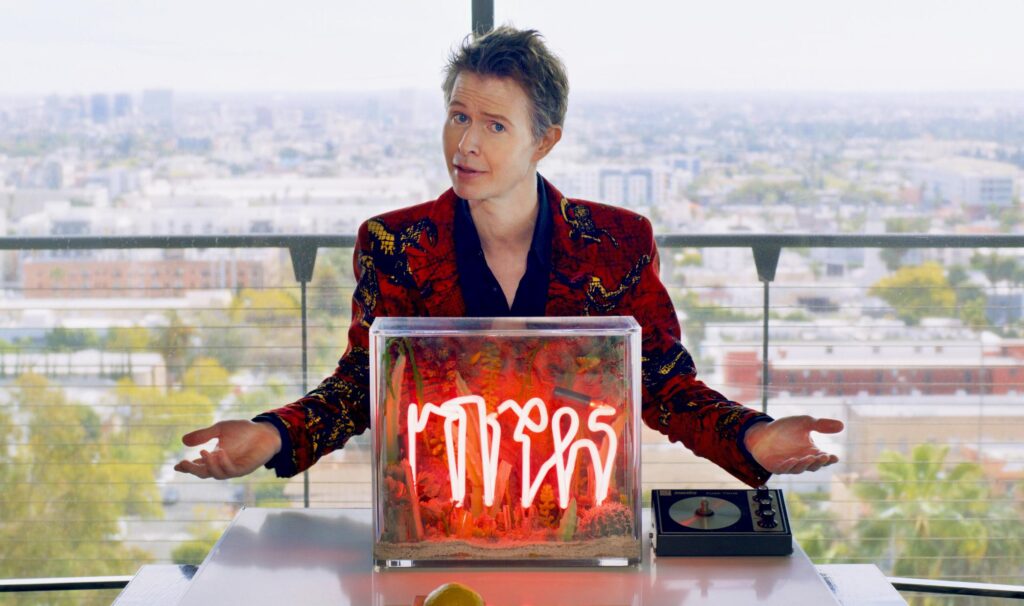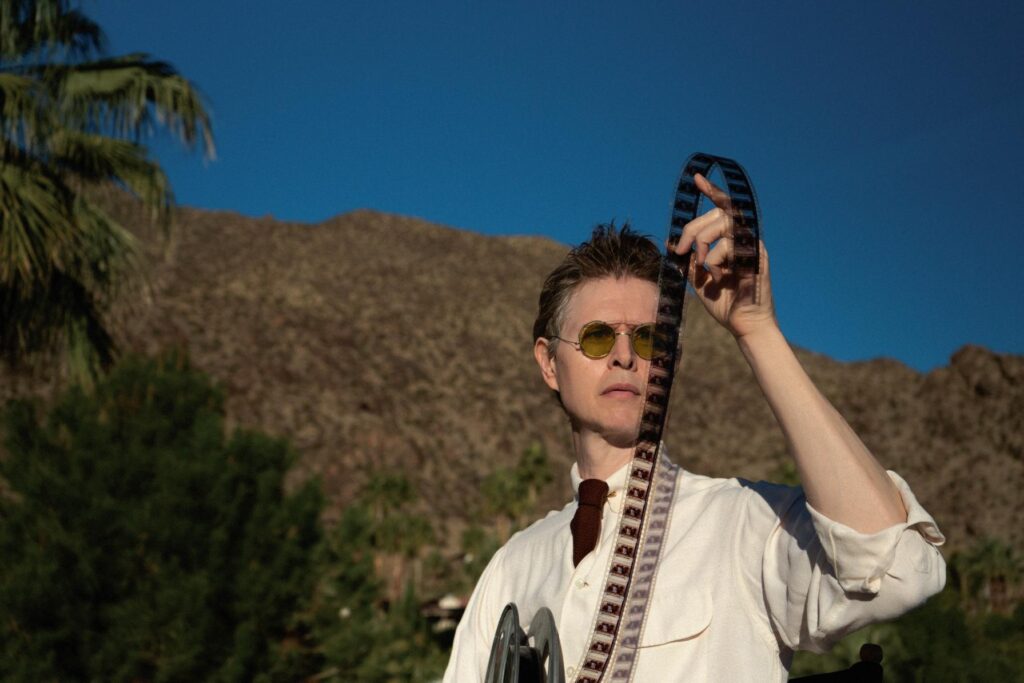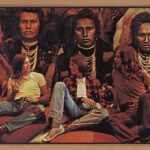
Ward White (Photo credit: Heidi Adams)
In Here Come The Dowsers, Ward White threads together character vignettes voiced by different personas within the Hollywood machine, exploring their collective disillusionment over time. This immacurately produced album is augmented by A-list collaborators including Grammy winners, John Spiker (Tenacious D, Beck, Beth Orton) and Tyler Chester (Andrew Bird, Jackson Browne), as well as Mark Stepro (The Wallflowers, Ben Kweller). He explains to Jason Barnard, that for him, success as a songwriter lies in resilience and avoiding repetition, with each album marking a new chapter in his artistic journey.
Can you tell us about the theme of Here Come The Dowsers? How did the concept of exploring Tinseltown history through a song-cycle come about?
Each song is voiced by a different cog in the Hollywood machine – producer, script doctor, agent, art director, fading “it” girl, etc… – and their collective anxieties comprise a time-honored continuum of disillusionment, the gradual tarnishing of the brass ring. It had been a few years since I’d made a specifically thematic record, so the first song I wrote, Continuity (concerning the existential crisis of Burt Reyonlds’ stunt double, whose custom elevator shoes have been purloined by a disgruntled hotel porter/aspiring actor) seemed like a good invitation down the rabbit hole.
What inspired you to delve into the grime beneath the glamour of Hollywood for this project?
It’s probably more accurate to describe it as the quotidian beneath the fantasy; most of the people I know in Los Angeles owe their livelihoods, in one way or another, to the business, and it gives you a richer picture of the elbow-grease cost associated with making the engine run. Naturally, there are numerous detours into Hollywood Babylon territory on the record, but that seam has been thoroughly mined. I enjoy writing for characters, and it seemed a more compelling approach to expand that reach beyond the top-billing. The tectonic layering of the industry is surprisingly dense.
Could you elaborate on the significance of the album’s title and how it relates to the content of the songs?
Dowsing, or water witchery, is the quack practice of locating underground aquifers using a wooden rod. As the evolution of Southern California is inextricably linked to water rights, and generations of Sisyphian water management initiatives (much of it to sustain its iconic, non-native flora), it felt like a good metaphor for the speculative history, and impossible promise of Hollywood.
What role does nostalgia play in shaping the narrative?
Hollywood hasn’t gentrified quite as rapidly as, say, New York City, so tangible remnants of the past are all around you – it’s easy to feel a direct line to the industry’s history. Most of the concrete streets and sidewalks in my neighborhood (Silverlake) were poured in the 1920’s, and many of the original houses remain, some untouched, from the Mack Sennett studio days. Plus, Hollywood has been subsisting on a steady diet of nostalgia from day one.
Can you discuss the involvement of your collaborators?
I’ve been fortunate enough to work with this same crew on my last six albums, since my old friend and drummer, Mark Stepro (of the Wallflowers) introducing me to John and Tyler when I relocated to L.A.; John, a long-time member of, and producer for Tenacious D (as well as a Grammy winner and recent Golden Globe nominee) tracks Mark’s drums, and mixes the records, as I pace the back of the control room, offering occasional distraction. Tyler, another Grammy winner for his work with Madison Cunningham, contributes all manner of keyboards, most often nailing things in one or two takes, with little or no prior preparation. He is an equally adept bassist, producer, and engineer. It should also be noted that they are the three nicest people in the business. For my part, I write and produce the whole mess, and provide all the vocals, guitars and bass.
Did your relocation from New York to Los Angeles have an influence?
I was a dyed in the wool New Yorker, and to a certain extent will always identify as such, so the move to L.A surprised even me. Initially there was a bit of culture shock (to be fair, mostly pizza related), but it’s been almost ten years, so I’m pretty well assimilated. I likely wouldn’t have written a record along these lines while I was living in New York, so the immersion in all things Los Angeles definitely informed the process.

‘Johnny Fontane’ seems to critique the old-guard studio system. Was this character inspired by any real-life Hollywood figures?
It’s a reference to The Godfather, and the character of Jack Woltz (“Johnny Fontane never gets that movie!”), who was purportedly based on Columbia Pictures head, Harry Cohn, but for the purposes of this song it’s an amalgam. The hints at Eastern European lineage suggest Louis B. Mayer, but, as with the rest of the record, the narrative needn’t be attached to any specific era – it could just as easily be transposed onto Robert Evans, or Harvey Weinstein. My characters give me clues, but rarely divulge the whole story.
How do you balance the storytelling aspect of your music with the musical arrangements and production?
The lyrical and musical components of my writing evolve in concert, almost always beginning with a single line that suggests a musical theme. I write and arrange in my head, and never put anything on paper until necessary for creating chord charts, or printed lyrics. The first song to be fleshed out often establishes the “sound” of the record, or at least offers a reasonable jumping-off point. From there, I just do my best to follow the dialogue. The final challenge, vocally speaking, is how best to voice the character (or characters) in question, while retaining the tone of the narrator (i.e., me.)

‘Horse Operas’ explores the struggles of a veteran art director. What inspired you to delve into the behind-the-scenes dynamics of filmmaking?
I’m a lifelong cinephile, and I made rather elaborate Super 8 movies as a teenager (the transition to video killed much of the romance for me), so the process and history of the form have always been a source of fascination. With the move to L.A., my exposure to so many professionals in different arms of the industry really opened my eyes to the guts of the thing, the “sausage-being-made” perspective, as it were. Every one of those names in the credits that nobody watches is a person whose life, and life’s-work, – no matter how arcane to the average viewer – is wrapped up in the Byzantine process of creating this most American of non-military exports. Don’t you want to know if the gaffer’s wife is cheating on him?
How do you navigate between the playful and the profound in your songwriting?
As a writer, I see all routes as navigable, and have no qualms about accessing any of them in service of reaching a destination. I’ve never bought into the notion that an artist is beholden to a particular style, or a specific tone within a piece, or their body of work. Mutability is key to avoiding the curse of predictable competence. Humor in songwriting often throws casual listeners off-balance, as the accepted industry wisdom is that the “singer-songwriter” is either a perennially wan, first-person solipsist, or a painfully earnest, Guthrie-esque, firebrand. What’s missed in that sort of reductive assessment is that humor, oblique or otherwise, is a much more efficient honesty delivery-system.
Can you tell me about your musical history? What are your highlights?
I always prefer to focus on the present work, so I feel pretty good about Dowsers, both the material and the production – spectacular mixes by Spiker. As far as previous stuff, there are somewhere in the neighborhood of fifteen albums out in the world, with stylistic nods from baroque pop to spoken word, but if I had to single out a few I’d spotlight Bob (2013), and Ward White Is The Matador (2014) – back to back concept records on wildly different themes: one being an opera about mind-controlling cockroaches, and the other a Last Tango In Paris-style compendium of dissolution. Both true stories.
Lastly, how do you personally define success as a songwriter and musician, and how does this album contribute to that definition for you?
Measuring artistic success by any remunerative metric is a fool’s errand, so I prefer to think of it as resilience, with an underpinning of restlessness. In short, avoid doing the same thing twice, and try not to die. This record, like all the others, is just another temporary foothold on the side of the mountain.
Further information
Here Come The Dowsers is out everywhere, May 17, on Think Like A Key Music.




